I'm trying to do finger recognition using opencv, which has been working correctly when simply processing one image from the capture, however after adding the while loop to have it go from single image capture to live processing, there seems to be a heap error showing. I'm currently running it on Visual Studio 2017 w/ OpenCV 3.41.
The error from the Microsoft Visual C++ Runtime Library is
Debug Assertion Failed!
File: minkernel\crts\ucrt\src\appcrt\heap\debug_heap.cpp
Line: 996Expression: __acrt_first_block == header

The code I'm using is:
#include "stdafx.h"
#include "opencv2/imgcodecs.hpp"
#include "opencv2/highgui.hpp"
#include "opencv2/imgproc.hpp"
#include <iostream>
using namespace cv;
using namespace std;
int myMax(int a, int b, int c);
int myMin(int a, int b, int c);
void mySkinDetect(Mat& src, Mat& dst);
Mat src; Mat src_gray;
int thresh = 100;
int max_thresh = 255;
RNG rng(12345);
void thresh_callback(int, void*);
int main(){
VideoCapture cap(0);
while (1) {
cap >> src;
Mat frameDest;
frameDest = Mat::zeros(src.rows, src.cols, CV_8UC1);
mySkinDetect(src, frameDest);
int erosion_size = 1;
Mat element = getStructuringElement(MORPH_RECT,
Size(2 * erosion_size + 1, 2 * erosion_size + 1),
Point(erosion_size, erosion_size));
erode(frameDest, frameDest, element);
erode(frameDest, frameDest, element);
namedWindow("Skin", WINDOW_AUTOSIZE);
imshow("Skin", frameDest);
blur(frameDest, src, Size(3, 3));
createTrackbar(" Threshold:", "Source", &thresh, max_thresh, thresh_callback);
thresh_callback(0, 0);
if (waitKey(30) == 27) { break; }
}
return(0);
}
void thresh_callback(int, void*)
{
Mat threshold_output;
vector<vector<Point> > contours;
vector<Vec4i> hierarchy;
threshold(src, threshold_output, thresh, 255, THRESH_BINARY);
findContours(threshold_output, contours, hierarchy, RETR_TREE, CHAIN_APPROX_SIMPLE, Point(0, 0));
vector<vector<Point>>hull(contours.size());
vector<vector<int> > hullsI(contours.size());
vector<vector<Vec4i>>defects(contours.size());
int index = 0;
int area = 0;
for (int i = 0; i < contours.size(); i++)
{
double a = contourArea(contours[i]);
if (a>area)
{
area = a;
index = i;
}
}
for (int i = 0; i < contours.size(); i++)
{
convexHull(contours[i], hull[i], false);
convexHull(contours[i], hullsI[i], false);
if (hullsI[i].size() > 3)
{
convexityDefects(contours[i], hullsI[i], defects[i]);
}
}
Mat drawing = Mat::zeros(threshold_output.size(), CV_8UC3);
for (size_t i = 0; i< contours.size(); i++)
{
Scalar color = Scalar(rng.uniform(0, 255), rng.uniform(0, 255), rng.uniform(0, 255));
drawContours(drawing, contours, (int)i, color, 1, 8, vector<Vec4i>(), 0, Point());
drawContours(drawing, hull, (int)i, color, 1, 8, vector<Vec4i>(), 0, Point());
}
int fingers = 0;
if (area>50)
{
for (int j = 0; j<defects[index].size(); ++j)
{
const Vec4i& def = defects[index][j];
float depth = def[3] / 256;
if (depth > 5) // filter defects by depth
{
int start = def[0];
Point ptStart(contours[index][start]);
int end = def[1];
Point ptEnd(contours[index][end]);
int min = def[2];
Point ptFar(contours[index][min]);
line(drawing, ptStart, ptEnd, Scalar(0, 255, 0), 1);
line(drawing, ptStart, ptFar, Scalar(0, 255, 0), 1);
line(drawing, ptEnd, ptFar, Scalar(0, 255, 0), 1);
circle(drawing, ptFar, 4, Scalar(0, 255, 0), 2);
fingers += 1;
}
}
}
std::string s = std::to_string(fingers-1);
namedWindow("Hull demo", WINDOW_AUTOSIZE);
putText(drawing, "Number Fingers = "+s, Point(drawing.cols/1.5, drawing.rows / 10), FONT_HERSHEY_PLAIN, 1.2f, Scalar(200, 0, 0), 2);
imshow("Hull demo", drawing);
}
int myMax(int a, int b, int c) {
int m = a;
(void)((m < b) && (m = b));
(void)((m < c) && (m = c));
return m;
}
//Function that returns the minimum of 3 integers
int myMin(int a, int b, int c) {
int m = a;
(void)((m > b) && (m = b));
(void)((m > c) && (m = c));
return m;
}
//Function that detects whether a pixel belongs to the skin based on RGB values
void mySkinDetect(Mat& src, Mat& dst) {
//Surveys of skin color modeling and detection techniques:
//Vezhnevets, Vladimir, Vassili Sazonov, and Alla Andreeva. "A survey on pixel-based skin color detection techniques." Proc. Graphicon. Vol. 3. 2003.
//Kakumanu, Praveen, Sokratis Makrogiannis, and Nikolaos Bourbakis. "A survey of skin-color modeling and detection methods." Pattern recognition 40.3 (2007): 1106-1122.
for (int i = 0; i < src.rows; i++) {
for (int j = 0; j < src.cols; j++) {
//For each pixel, compute the average intensity of the 3 color channels
Vec3b intensity = src.at<Vec3b>(i, j); //Vec3b is a vector of 3 uchar (unsigned character)
int B = intensity[0]; int G = intensity[1]; int R = intensity[2];
if ((R > 95 && G > 40 && B > 20) && (myMax(R, G, B) - myMin(R, G, B) > 15) && (abs(R - G) > 15) && (R > G) && (R > B)) {
dst.at<uchar>(i, j) = 255;
}
}
}
}